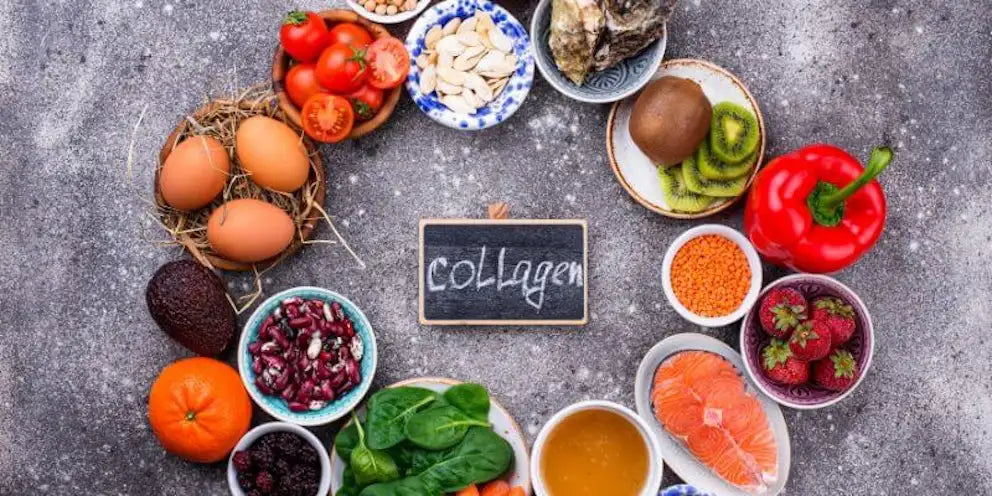COLLAGEN: WHAT IT IS, EFFECTS AND HOW TO TAKE IT
What is collagen anyway?
Collagen is one of the main organic components of our skin, making up 80% of it. The protein is also found in bones, tendons, cartilage and teeth - but its most elementary role is as a component of connective tissue.

DR. ANNE LATZ:
"Collagen is a major component of the human body and crucial for e.g. healthy muscles, smooth skin, shiny hair and healthy fingernails. To stay healthy, strong and agile, we need sufficient amounts of collagen peptides."
What is collagen good for?
Collagen in the skin can be compared to a scaffold that keeps our skin tight, firm and elastic and prevents it from collapsing and forming wrinkles. So, at a young age, the collagen scaffold is still very strong, while as we age, it becomes weaker and weaker, creating the perfect foundation for wrinkles in the skin. It is important to note that collagen production does not only become weaker because nature intended it that way - external influences such as smoking, solar radiation or environmental pollution also contribute their (negative) part to the fact that collagen is formed less and more slowly.

FOOD WITH COLLAGEN
Food products that contain pure collagen are always of animal origin. These are, for example, pork or beef rinds, oxtail or meat cooked on the bone. Gelatin is also composed of 90% collagen.
But to supply the body with more collagen, relying directly on animal bones is unnecessary. Another way, much more pleasant for all vegetarians, is to take various other vitamins, which in turn are responsible for collagen formation. Important in this respect are, for instance, vitamin A and vitamin C, which are indispensable for collagen production. Vegetables can also help in this respect, as spinach, cabbage, parsley, or carrots provide the body with good vitamins. Fruit and vegetables often also contain lycopene, which has an antioxidant effect and removes stress from the cells. In addition, oatmeal is considered a natural promoter of collagen production as it contains a lot of L-arginine, essential for cell renewal. Eggs also provide your body with the amino acids lysine and proline. With their help, collagen can also be produced better.
FAQs ABOUT COLLAGEN
FAQs ABOUT COLLAGEN
According to reports, collagen provides the skin with maximum moisture from the inside and gives the skin a youthful, firm appearance. At the same time, Verisol stimulates skin metabolism. Collagen is particularly effective as a dietary supplement in combination with vitamin C. Vitamin C is important for connective tissue metabolism, i.e. the cross-linking of collagen and elastin.
A collagen deficiency can manifest in signs such as sagging skin, wrinkles, reduced mobility and functionality of joints, and degradation of bones and cartilage.
Some studies report that the structural protein collagen plays an important role in the flexibility of joints and bones, as well as the pressure resistance of articular cartilage. Thus, an intake of collagen can maintain the function of the joints and relieve pain, such as osteoarthritis or osteoporosis.
Very few side effects are known with the use of collagen. In very rare cases, side effects such as nausea, vomiting, diarrhoea, headache and dizziness may occur.
No, collagen is not vegan. As mentioned, foods that contain pure collagen are always of animal origin. These are, for example, pork or beef rind, oxtail or meat cooked on the bone. Gelatin also consists of 90% collagen.
Daily dosages between 2 g and 10 g of collagen are recommended depending on the dosage form. Our Born This Way and Bootylicious Vitamins contain 2.5 g of patented Verisol collagen peptides per daily dose.
Let customers speak for us
Studies on the effectiveness of collagen
We provide the following scientific studies for your general information. The results obtained in these studies do not necessarily apply to all individuals. Feel free to click on the corresponding links for more detailed information.
Oral intake of specific bioactive collagen peptides reduces skin wrinkles and increases dermal matrix synthesis
In this double-blind, placebo-controlled study, the efficacy of the specific bioactive collagen peptide (BCP) VERISOL® on the formation of eye wrinkles and the stimulation of the biosynthesis of procollagen I, elastin and fibrillin in the skin was investigated.
Collagen supplementation in skin ageing: A trend or the future?
In recent years, oral collagen supplements have become a popular and trendy treatment in the world of skin health. Here are some of the most important studies in the literature on this topic.
Collagen supplementation for skin health: a mechanistic systematic review.
The point is that over the past decade, many researchers have attempted to evaluate the effects of collagen supplements on skin ageing.
OUR BEARS WITH COLLAGEN
OUR BEARS WITH COLLAGEN


















